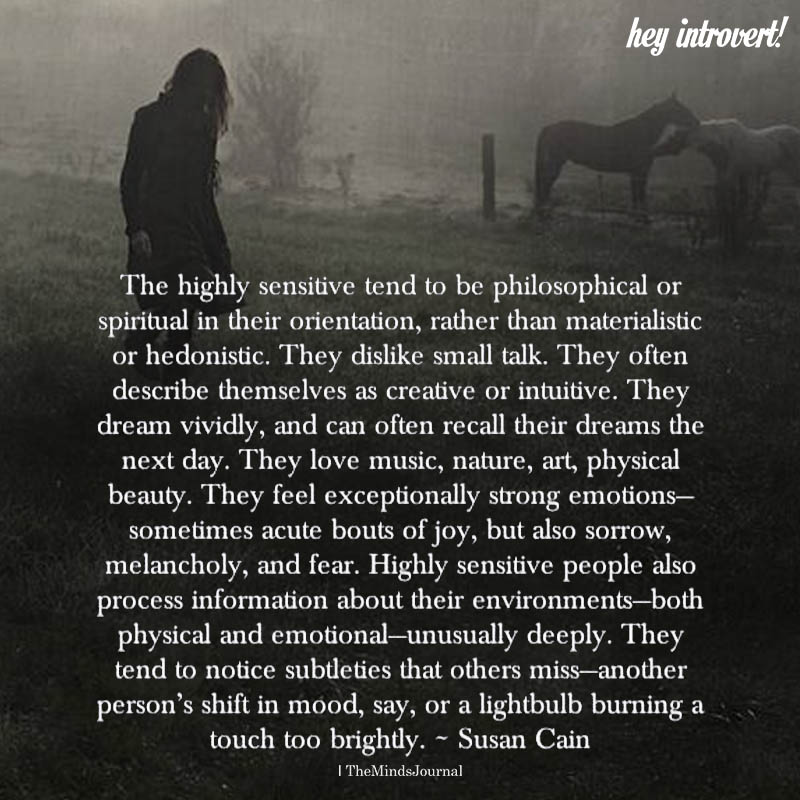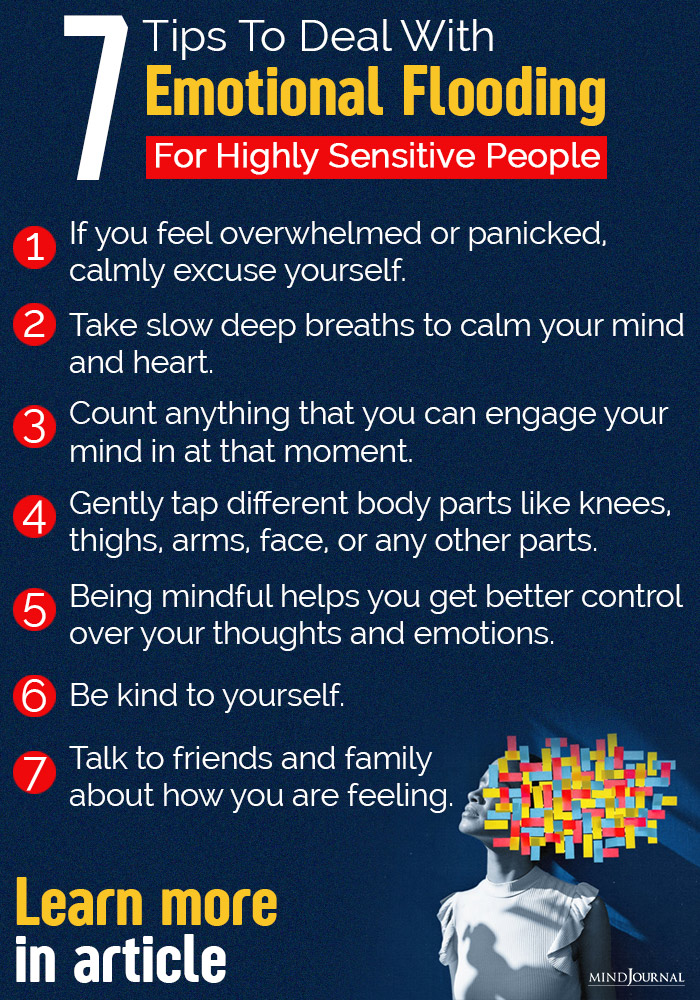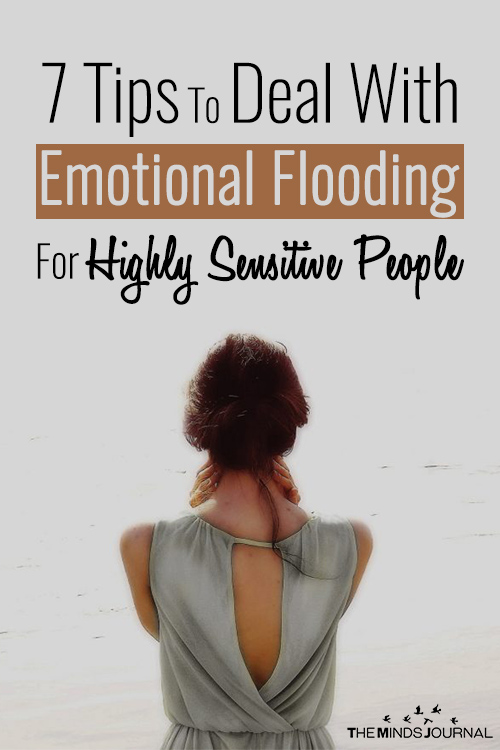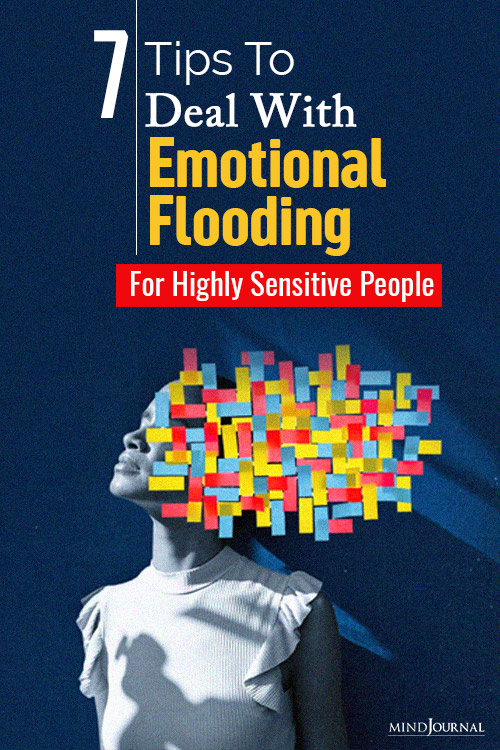Life can be a bit too much. Especially for us, the highly sensitive people (HSPs). Even daily life can feel like an unbearable struggle at times. We think too deeply. We feel too deeply. We care too deeply.
As emotional flooding for HSPs, is very common, we can easily get overwhelmed by even the smallest things that other people might not even notice. What may be a minor issue for others, can make us stressed, panicked, and upset.
Drowning In An Emotional Flood
The smallest stimulus can make most of us HSPs feel ‘emotionally flooded’. We can easily become mentally and emotionally overwhelmed by social, environmental, and internal stimuli.
But why do we feel like this?
Our nervous system is biologically wired in a different way that makes us process different stimuli very deeply.

This means that HSPS are highly responsive to even small stimuli. Our brain is simply hardwired in a way that we are always prepared to respond immediately. And this is why emotional flooding for HSPs can feel very discomforting most of the time.
Are You A Highly Sensitive Person?
Being an HSP does not mean that you get offended by some negative remark from a co-worker or a friend or that you cry while watching chick flicks. A highly sensitive person is very susceptible and sensible which usually leads to emotional flooding for HSPs.
So how can you know if you are a highly sensitive person? Here’s how.
1. Do loud noises and people make you want to run away?
2. Do you notice even the slightest change in the temperature?
3. Do bright lights feel blinding to you?
4. Is chaos intolerable to you?
5. Do art, music, poetry, and stories make you feel emotional?
6. Do you avoid loud parties and pubs?
7. Can you easily sense the slightest change in tone when others talk to you?
8. Do you know if something isn’t right, even though you can’t put your finger on it?
9. Do you overreact to stressful situations and relationship problems?
10. Can you sense when other people feel overwhelmed?
11. Do you feel annoyed when you are hungry?
12. Is multitasking a nightmare for you?
13. Is it hard for you to make decisions?
15. Do you prefer privacy and peace at work?
16. Do you need some alone time to recharge at the end of a day?
No. You’re not crazy. You are not antisocial or weird or a buzzkill. In fact, a HSP can be a very adventurous, fun, amazing and a strong person, especially when they want to be.
Related: 25 Signs You’re A Highly Sensitive Person
You appreciate the little things in life that most people fail to notice.
You become isolated most of the time as you can’t tolerate or even enjoy certain things that most of your friends and colleagues have no problem with.
Emotional flooding for HSPs is a result of being hypersensitive to external stimuli coupled with deeper cognitive processing and emotional sensitivity. And you are not just emotionally sensitive, you can also be physically sensitive to certain stimuli as well. You just think and feel a little more deeply than the next person.

Do You Feel Emotionally Flooded?
Emotional flooding can be a very unique experience for each one of us. Here are some symptoms to help you identify emotional flooding:
1. You feel it’s hard to focus as you try to process the experience and your brain feels overwhelmed.
2. You feel stressed and anxious. You either shut down or withdraw as your brain heats up with activity.
3. You have an internal war going on as you cope with the fight-or-flight response.
4. You find it hard to recognize your emotions as you feel a rush of mixed feelings all at once.
5. You feel light-headed, have tunnel vision and sweaty hands along with other physical symptoms.
Irrespective of the symptoms, emotional flooding for HSPs can be a devastating and uncomfortable experience that can last longer than we may want it to. Perhaps, this is why we need emotional regulation.

Dealing With Emotional Flooding For HSPS
Wondering how to deal with flooding? Relax. We’ve got you covered. Here are 7 effective strategies to help you decompress when you feel emotionally flooded.

#1 Excuse yourself.
If you feel overwhelmed or have a panic attack, calmly remove yourself from the scenario.
It is okay to excuse yourself for a few moments, collect your thoughts, calm yourself down and then go back, if and when you are ready. You can take a short break to the washroom, the cafeteria, the parking lot, or any place you feel comfortable with. Take some time off. Call a family member or friend. Listen to some music. Do whatever works for you.
Understand that you have the option to leave if you need to.
Read 20 Things You Do Differently Because You’re A Highly Sensitive Person
#2 Just breathe.
You may have heard this one before. But that’s because it IS the most effective and easiest panic and stress reduction technique available to us at any given time.
Breathing is the magic pill you need.
Simply calm yourself down, clear your mind for a moment and subtly concentrate on your breathing. Take slow deep breaths in and out. Count to 4 while inhaling, hold your breath for another count of 4, then exhale while counting to 4 again. This will slow down your heart rate and your mind will calm down. Trust me, it works!
#3 Start counting.
Yes, really. Just start counting. I know it sounds weird. But it helps. Count to 100. Count 10 things you can see, count 5 things you can touch, count 3 things you can hear. Count backward from 50 to 1.
Count anything that you can engage your mind in at that moment. This will help your brain to shift focus from being anxious and put it to work.
#4 Tap your body.
Tapping is another excellent yet simple method to counter emotional flooding for HSPs. Gently tap different body parts like knees, thighs, arms, face, or any other part that does not feel or look weird. However, you need to understand the difference between conscious tapping and fidgeting.
Tapping allows your brain to get distracted from all the anxiety and refocus itself to a more logical action. Just give it a try and you will know how it can work wonders.
#5 Be mindful.
I simply cannot overemphasize the importance of practicing mindfulness. Mindfulness is the simple act of consciously being in the present moment.
It is a highly effective psychological process that brings your attention to the present moment and experience what is happening right now. It not only calms your mind, helps you reduce stress, and eliminate negative thoughts, mindfulness also helps you get better control over your thoughts and emotions.
You can practice mindfulness by doing 10 minutes of meditation daily. This is one of the best practices for your mental health.
Related: 20 Things You Do Differently Because You’re A Highly Sensitive Person
#6 Be kind to yourself.
What would you do if your best friend was experiencing emotional flooding? You will be kind, supportive, and caring. Right? Now imagine yourself to be your best friend and stop being so hard on yourself.
Life sucks. So be kind to yourself, and self-talk to yourself to offer some much-needed motivation in a non-judgmental way. Be empathetic and treat yourself. Tell yourself you are fine and it’s all going to get better in a few minutes.
Realize that you are a stronger person for surviving such an experience with such a calm demeanor.
#7 Talk to a friend.
One of the worst things about emotional flooding for HSPs is the feeling of being isolated and lonely. However, it doesn’t have to be that way.
It can be helpful to share your feelings and thoughts with a trusted friend, a family member or your partner.
Tell them exactly how you felt and how you managed to deal with it or even if you failed miserably to control your feelings. It doesn’t matter. Just express yourself and let it all out.
They will not only understand your feelings and offer you some loving kindness, but they might also give you a different perspective on how to deal with flooding. You will be surprised at how amazing some people can be.
If you feel your flooding is getting out of hand, then it may be helpful to speak with a therapist or a professional counselor.
Emotional flooding for HSPs can be a regular experience. You are among the 20 percent of the population who are highly sensitive people. Yes. You are not alone. Try not to take everything personally and learn to let go of certain thoughts and emotions that do not serve you. Stop being your own worst critic.
Embrace your true self as you are a unique gift to this world.










Leave a Reply
You must be logged in to post a comment.